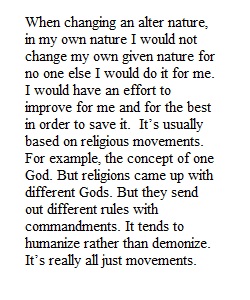


Q Reading Response Journal 1: Pied Beauty • Points 20 • Submitting a text entry box or a file upload This Reading Response Journal is based on your readings from SECTION I: NATURAL IMPERFECTION AND HUMAN LONGING Chapter 1: The Search for Perfection Gerard Manley Hopkins: Pied Beauty Official website for Gerard Manley Hopkins. (Links to an external site.) One type of assignment you will encounter this semester is a Response Journal to something from your text. The questions for these assignments are worth 20 points each (assessed by the rubric below). Overall, these informal writing assignments will account for 20% of your course grade. For each of the assignments, you will be asked to demonstrate the following competencies from the course objectives: • Engage with the text and explore worldviews • Describe history/cultures/values/aesthetics using a humanistic approach • Explain texts (films and readings) from multiple perspectives Prompt for Response Journal 1: 1. When and to what extent should we strive to change and alter nature, especially our own given nature, in an effort to improve or save it? 2. When and to what extent should we strive to accept and appreciate nature and our own given nature in an effort to know or savor it? 3. How is imperfection related to beauty? Is the relationship different in nature than in man-made things? Is it different in human beings? 4. Why would a perfect Creator create an imperfect world? Response Journal Rubric (1) Criteria Ratings Pts This criterion is linked to a Learning OutcomeEngagement 5 pts Exceeds: Student fully engages the assigned topic with breadth and depth of thinking that explores various worldviews 4 pts Meets: Student engages the assigned topic with less successful detail 3.5 pts Minimally Meets: Student refers to the topic but lacks sufficient development of ideas 2 pts Does Not Meet: Student attempts but does not successfully engage the topic 0 pts No Attempt 5 pts This criterion is linked to a Learning OutcomeHumanistic Approach 5 pts Exceeds: Student is able to describe history, culture, values and/or aesthetics from the film or reading selection with confident understanding of ideas 4 pts Meets: Student is able to describe some of the relevant ideas from the film or reading selection 3.5 pts Minimally Meets: Student refers to the topic but lacks sufficient development of ideas 2 pts Does Not Meet: Student attempts but does not successfully use a humanistic approach to the topic 0 pts No Attempt 5 pts This criterion is linked to a Learning OutcomeExplanation and Analysis 10 pts Exceeds: Student is able to explain ideas from the film or reading selection by applying multiple perspectives toward an examination of the meaning of the work and its relevance to humans 8 pts Meets: Student is able to discuss the meaning of the work to humans but perhaps without great depth or detail 7 pts Minimally Meets: Student can describe or identify how a text holds meaning or importance to humans but lacks great variety of expression 5 pts Does Not Meet: Student attempts but does not successfully explain thinking 0 pts No Attempt 10 pts Total Points: 20 Be sure to cite a specific example both from the textbook and from contemporary life in the world around you. Note: when citing the textbook, please use the MLA style citation using the abbreviation for the editors and the page number: (Sayre et al. 31) to indicate where the information comes from in your text. The information in the parentheses means the editor in chief, Sayre, plus the abbreviation "et al." which means "and others" along with the page number - no comma necessary. A Reminder: Students often ask "how much" they have to write for these assignments. There is no set word count, but you must make sure to answer the question with as much depth and detail as you can - and usually that takes somewhere between 250-500 words (1-2 double-spaced pages) per response. Finally, before we get to the rubric, please remember that Howard Community College expects Academic Honesty from students on every assignment. Please review the college's policies on Academic Honesty here. (Links to an external site.) Rubric:
View Related Questions